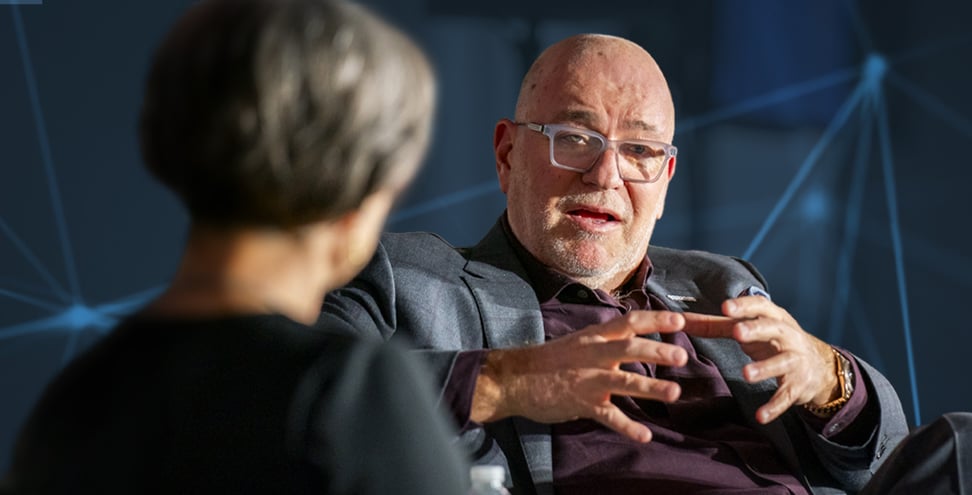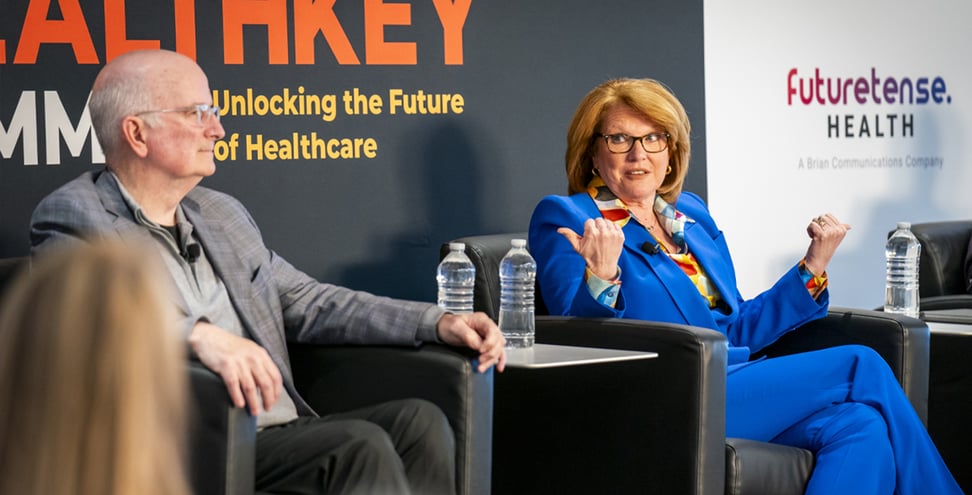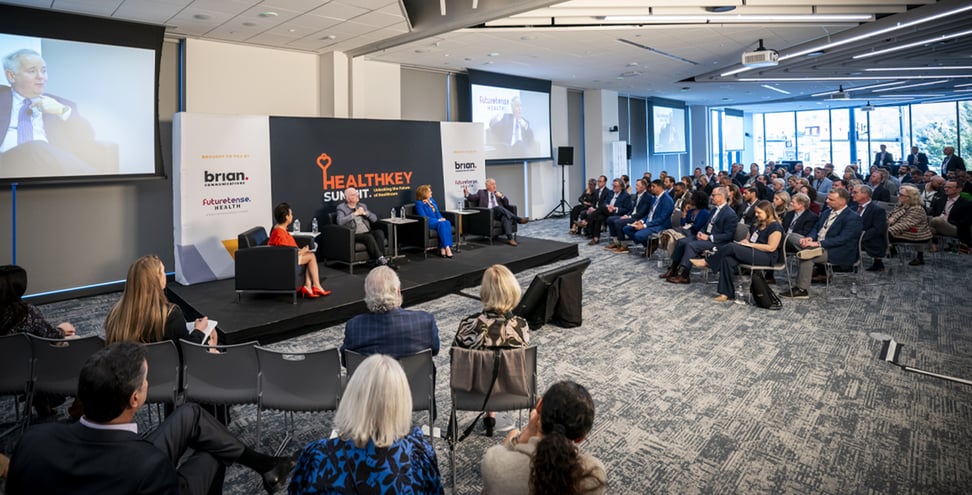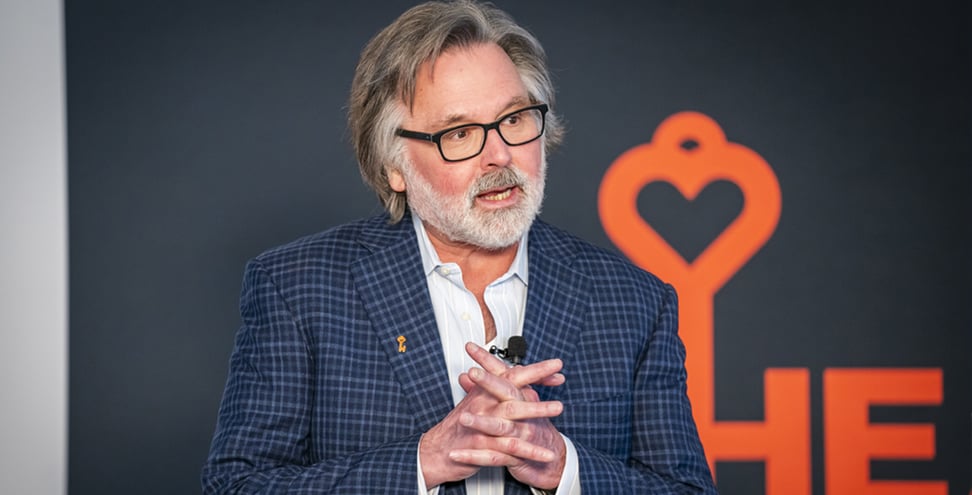 Steve Collis with moderator Kelly McBride
Steve Collis with moderator Kelly McBride
We kicked off the 2024 Health Key Summit for an evening of networking and lively, insightful discussions about the future of healthcare. The event — convened by Brian Communications and Futuretense Health, and hosted by Cencora — brought together key thought leaders, industry executives and innovators for an honest and optimistic look at the unique challenges healthcare companies are facing today and the opportunities ahead.
As Brian said, “We all have one thing in common: We’re not up on the stands watching; we’re actually out on the field making unimaginable healthcare dreams a reality.”
The opening panel was a powerhouse of regional leaders, with Madeline Bell, CEO of Children’s Hospital of Pennsylvania; Kevin Mahoney, CEO of the University of Pennsylvania Health System; and Jack Lynch, President and CEO of Main Line Health diving into what it takes to serve their diverse communities while maintaining financial sustainability. Fawn Lopez, publisher emeritus of Modern Healthcare, served as moderator.
 Kevin Mahoney, Madeline Bell
Kevin Mahoney, Madeline Bell
The evening was capped by a fireside chat with Steve Collis, CEO and President of Cencora, hosted by Kelly McBride, Public Editor of NPR and Senior Vice President of the Poynter Institute.
Here are three takeaways:
Health systems are being squeezed by the labor shortage and financial pressures. To move forward, we’ll need to re-imagine the delivery of care.
That starts with the provider pipeline. As Kevin Mahoney said simply, “We need to get people into the workforce faster and make it quicker to become a doctor.”
And with the rate of hospital closures accelerating — nearly half of all closures in the past two decades have occurred in just the last five years — Jack Lynch believes that changing the method and setting of care is critical to avoiding healthcare deserts:
How do we change the model of care? We take it into the home. We take it to an ambulatory environment. If we don’t change the way we deliver care, we’re not going to have enough doctors, nurses or beds.
Technology can help relieve the burden on providers, said Madeline Bell, by reducing the non-clinical workload of medical staff and enabling new solutions for care delivery that can prevent emergency visits.
“We invest in better technology to address issues before [patients] need to come to an ER,” said Madeline Bell. “Our strategy is aligned with payers’ strategy: To keep people at home to prevent unnecessary hospitalization.”
“We haven’t used technology enough in healthcare!” Collis said. “We have to use every advantage we can to increase productivity and take the cost out of the system, including bedside technologies like scanning and monitoring systems.”
 Fawn Lopez, Kevin Mahoney, Madeline Bell, Jack Lynch
Fawn Lopez, Kevin Mahoney, Madeline Bell, Jack Lynch
Large organizations are creating impact by focusing on the individual patient.
At our core, we care deeply about the children of our communities, and we are always thinking of how to benefit the community. We’re helping to rebuild people’s homes, we’re getting lead out of people’s pipes. Either through philanthropy or direct funding, we want to address those determinants of health.
Madeline Bell, President & CEO of Children's Hospital of Philadelphia
For the leaders and staff of Penn Medicine, “I’ve tried to create a system where the North Star is always our patient,” Kevin Mahoney said.
There’s an opportunity to create new connections in medicine by harnessing global data sets.
With operations now in 50 countries, Steve Collis shared how Cencora is working to leverage its vast data sets to benefit pharmaceutical manufacturers and patients.
“I think with the knowledge we have between the U.S. and Europe, and a little bit in Central and South America, and our advanced understanding of clinical trial logistics and commercialization services, we’re in a unique position with the datasets we manage,” Collis said.
 Brian Tierney
Brian Tierney
After the pandemic illustrated the fragility of the global supply chain, Collis sees an opportunity to share data-driven insights with the company’s manufacturing partners, helping them manage risk from climate impacts and geopolitical tensions. He also wants to use data sets to help manufacturers plan for stockpiling, eliminate drug shortages and connect clinical trials with patients in underserved areas.
Stay tuned for more from the HealthKey Summit 2024, as leaders discuss what’s ahead for the industry — and what’s possible.